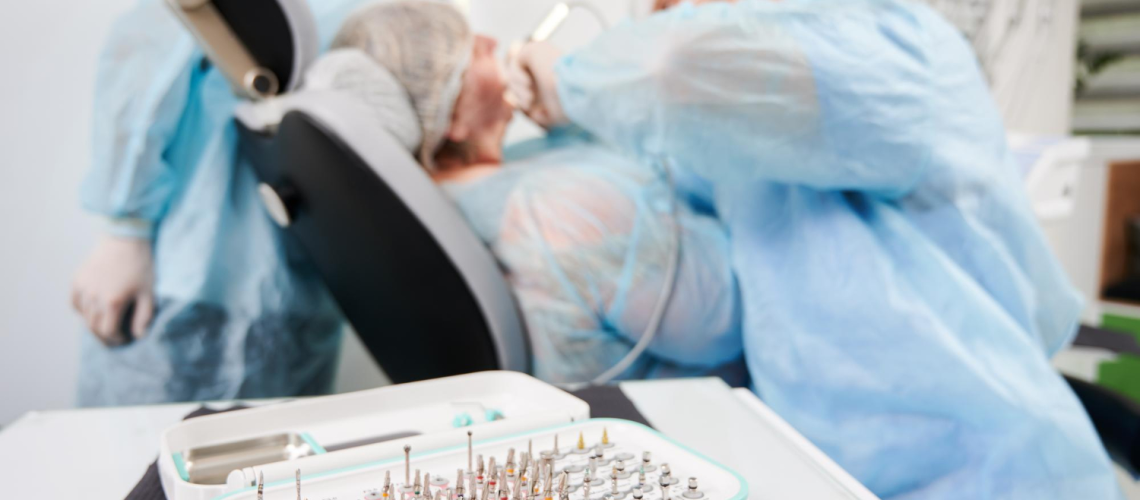Dental implants have revolutionized the way we approach missing teeth, offering a durable and aesthetically pleasing solution for many. However, like any medical or dental procedure, they come with their own set of considerations. Let’s look into the aspects of dental implants, focusing on their safety, potential downsides, and the optimal circumstances for their placement.
What Is The Downside Of Dental Implants?
While most dental implants work successfully, they are not devoid of potential downsides. The dental implant procedure is invasive, requiring surgical intervention to place the artificial tooth root into the jawbone. This process can lead to surgical risks such as infection, damage to surrounding teeth or blood vessels, and nerve damage, which might cause pain, numbness, or tingling in your natural teeth, gums, lips, or chin.
Implant dentistry also requires a significant commitment to oral health and time. The entire process, from dental implant placement to the final restoration, can take several months. During this period, patients may experience discomfort and have to adhere to dietary restrictions to ensure the implant site heals properly.
What Risks Are Associated With Dental Implants?
Dental implants represent a forefront solution in restorative dentistry, offering individuals with missing teeth a chance to reclaim their smile, speech, and chewing function. However, as with any surgical procedure, dental implant surgery is not without its risks. Understanding these potential complications is crucial for patients considering this form of treatment. Here, we delve into the risks associated with dental implants, offering insights to help inform your decision.
Surgical Complications
The process of dental implant placement is a surgical procedure that, albeit routinely successful, carries inherent risks akin to any form of surgery. These can include:
- Infection at the Implant Site: Like any surgery, there’s a risk of infection once the implant has been placed into the jawbone. If not promptly addressed, this can lead to significant health issues and potential implant failure.
- Injury to Surrounding Structures: The placement of an implant is a delicate process. There’s a risk of damaging surrounding teeth, blood vessels, or nerves. Such damage can result in pain, numbness, or sinus complications, especially if the upper jaw implants affect sinus cavities.
- Nerve Damage: Particularly concerning is the risk of nerve damage, which can cause pain, tingling, or numbness in your natural teeth, gums, lips, or chin.
Post-Surgical Risks
Following the surgical procedure, patients are not entirely out of the woods. Some risks develop post-surgery, including:
- Implant Failure: While most dental implants are successful, there’s a chance of implant failure. This can be due to poor osseointegration, where the bone fails to grow around the implant securely, or the body’s rejection of the artificial tooth.
- Peri-implantitis: This condition arises from the inflammatory response of gum and bone around the implant. It is often the result of poor oral hygiene and can lead to bone loss and implant failure if untreated.
- Bone Loss Around the Implant: Over time, there might be a loss of bone around the implant, which can destabilize it. This condition, often related to peri-implantitis, requires prompt attention to avoid implant failure.
Long-Term Risks
For the long-term health of dental implants, continuous care is essential. Long-term risks include:
- Wear and Tear: Just like natural teeth, the artificial tooth (or crown) placed atop the implant can wear down over time or even break, requiring replacement.
- Aesthetic Changes: As time passes, there may be changes in your gum tissue and the surrounding teeth that can affect the appearance of the dental implant and your smile.
Pre-Surgical Considerations To Mitigate Risks
A thorough evaluation by an oral and maxillofacial surgeon or an experienced oral surgeon can significantly mitigate these risks. Patients with insufficient bone density may require a bone graft, and those with gum disease must address these issues before proceeding with an implant. Furthermore, conditions such as uncontrolled diabetes or habits like heavy smoking can affect healing and the success of the implant, necessitating a tailored approach to treatment.
What Is The Best Age For Dental Implants?
The path to getting dental implants is frequently filled with inquiries and contemplations, including queries about the optimal age for this procedure. Dental implants have become a significant solution for individuals grappling with the loss of teeth, providing a level of function and visual similarity to natural teeth. Yet, determining the most suitable age for dental implant surgery goes beyond mere age calculations to consider various aspects such as oral health, bone growth, and general health.
Understanding the Age Factor in Dental Implants
Bone Growth and Maturity
The pivotal consideration in determining the best age for dental implants revolves around jawbone growth and maturity. Dental implants require a strong and fully developed jawbone for successful placement and integration. This criterion typically precludes young patients, as their jawbones are still in the developmental stage. Most dental professionals agree that dental implant procedures should ideally wait until bone growth has completed, which usually occurs in the late teens to early twenties.
The Senior Spectrum
On the opposite end of the age spectrum, there’s no upper age limit to getting dental implants. Seniors can, and often do, benefit significantly from dental implants. The key considerations for older adults include overall health status and the presence of adequate bone density to support the implant. With advancements in dental care and the availability of bone grafting techniques, age itself is rarely a barrier to dental implant success.
The Ideal Candidate: Beyond Age
While age serves as a general guideline, the ideal candidate for dental implants is defined more accurately by health and oral conditions than by chronological age. Here are some critical factors that play a role:
- Oral Health: A healthy gum tissue free of periodontal disease is crucial for the success of dental implants.
- Bone Density: Adequate bone density is required to support the implant, making this a key factor in assessing candidacy.
- Overall Health: Conditions that impair healing or pose surgical risks, such as uncontrolled diabetes or cardiovascular issues, may necessitate additional considerations or pre-treatments before proceeding with dental implants.
Age Is Just A Number: Individual Assessments Prevail
The determination of the best age for dental implants underscores the importance of individual assessments. Dental professionals conduct comprehensive evaluations, including dental history, oral health status, and systemic health considerations, to ascertain the viability of dental implants for each patient. This personalized approach ensures that factors beyond age, such as the readiness of one’s jawbone and general health, are prioritized in making a decision.
When Should You Not Get Dental Implants?

the decision to opt for dental implant systems should be approached with caution, as certain conditions and circumstances can elevate the risk of dental implant failure. Understanding when to potentially avoid dental implants is crucial for patients to make informed decisions about their oral health.
Insufficient Bone Density
One of the foundational requirements for a successful dental implant is adequate bone density. The implant needs a strong bone base for support and osseointegration, the process where the bone fuses with the implant. Without sufficient bone density, the risk of implant failure increases significantly. Although bone grafting can sometimes address this issue, it may not be suitable for all patients, making dental implants a less viable option.
Active Gum Disease
The health of your gums plays a critical role in the success of dental implants. Active gum disease, especially periodontitis, can jeopardize the stability of an implant. Gum disease leads to inflammation, and bone loss, and can create an unsuitable environment for implant integration. Treating gum disease before implant surgery is essential, but if it cannot be controlled or eradicated, dental implant may not be advisable.
Certain Medical Conditions
Certain systemic medical conditions can impede healing and increase the risk of dental implant failure. These include uncontrolled diabetes, autoimmune diseases, and conditions that necessitate immunosuppressive medications. Such health issues can slow down the healing process and interfere with the body’s ability to integrate the implant properly. A thorough medical assessment is critical before proceeding with dental implants.
Smoking And Tobacco Use
Smoking and the use of tobacco products significantly impact oral and overall health. Tobacco use restricts blood flow to the gums, which can hinder healing after dental implant surgery and increase the likelihood of implant failure. Patients who smoke are often advised to quit well in advance of undergoing the dental implant procedure to improve their chances of success.
Insufficient Oral Hygiene
Maintaining excellent oral hygiene is paramount for the longevity of dental implants. Poor oral hygiene can lead to infections around the implant site, contributing to gum disease and eventual implant failure. Patients who struggle with maintaining good oral hygiene practices may need to consider alternative options or address these habits before pursuing dental implants.
Young Patients With Incomplete Jaw Growth
Dental implant systems are typically not recommended for younger patients whose jawbones have not yet fully developed. Placing implants in a growing jaw can disrupt natural bone growth and lead to complications. It’s essential to wait until bone growth is complete before considering dental implants.
Who Is Not A Good Candidate For Dental Implants?
Beyond those with significant health concerns, individuals with poor oral hygiene or those unwilling to commit to the process may not be good candidates. The success of dental implants heavily relies on the patient’s ability to maintain excellent oral health and follow through with the necessary follow-up appointments.
Do You Have To Go Without Teeth While Waiting For Implants?
Not necessarily. Depending on your situation, options such as immediate-load dental implants or temporary dentures can provide solutions that allow you not to go without teeth during the healing process. However, these options are not suitable for everyone, and the decision should be made in consultation with your oral and maxillofacial surgeon or oral surgeon.
Final Thoughts
When it comes to replacing missing teeth, dental implants have emerged as a highly effective and popular solution, offering the look, feel, and function of natural teeth. But, are dental implants safe? The simple answer is yes, dental implants are considered safe for most people. They have a high success rate, proven by decades of research and clinical use. However, as with any surgical procedure, it’s important to understand the potential risks and ensure you’re a suitable candidate to minimize complications.
Safety in dental implants largely depends on proper planning, skilled execution, and post-operative care. Factors like adequate bone density, healthy gums, and overall wellness play crucial roles in the success of dental implants. It’s also critical to have the procedure done by experienced professionals who can navigate the complexities of dental implant placement and address any issues that may arise.
If you’re considering dental implants and wondering about their safety, let Elite Smiles guide you through the process with confidence. Contact us today to schedule your consultation and take the first step toward a safe, effective solution for your missing teeth. Together, we’ll ensure that dental implants are the right choice for you.

